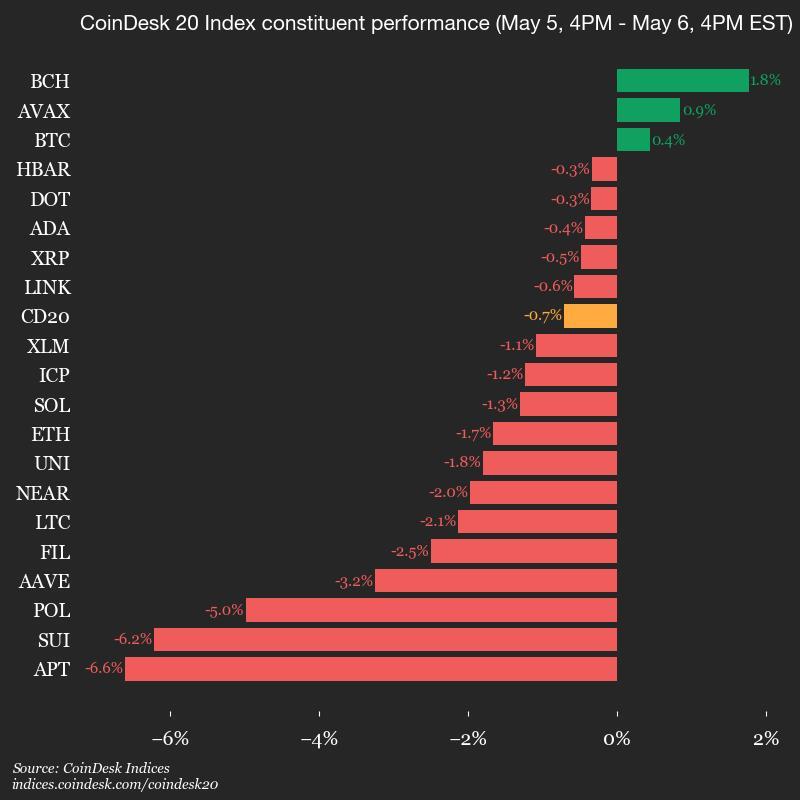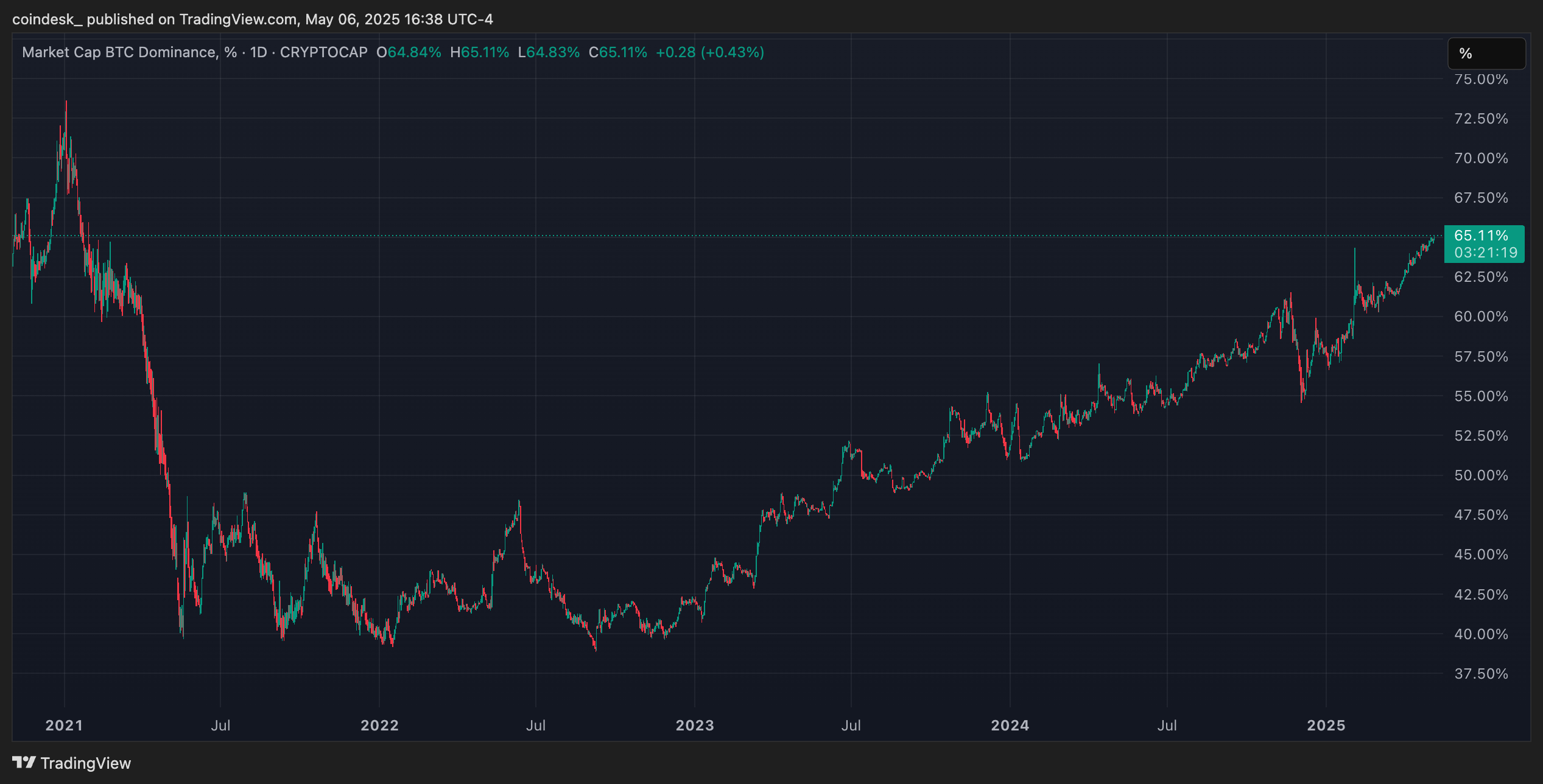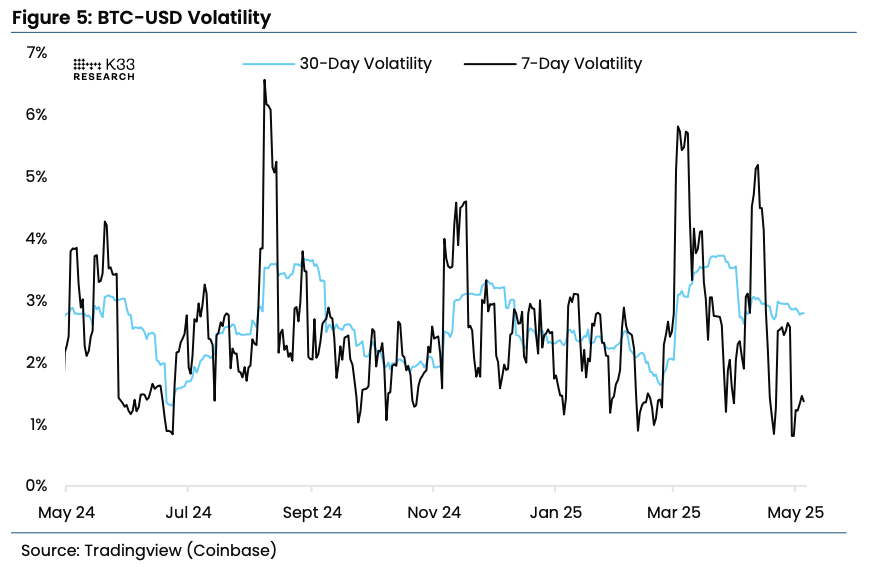Uncategorized
DogeOS Raises $6.9M to Launch Dogecoin App Layer

DogeOS, an application development layer for the Dogecoin ecosystem, announced the successful closing of a $6.9 million funding round led by Polychain Capital.
This capital infusion will fuel the expansion of DogeOS to allow developers to build a wide range of consumer apps — from gaming to artificial intelligence —while strengthening the dogecoin (DOGE) ecosystem.
In software terms, a layer is an operating system-like collection of software. DogeOS is specific to the Dogecoin blockchain.
A bump in demand helps strengthen the fundamentals of memecoin DOGE, allowing the creation of applications and other decentralized finance (DeFi) services that bolster DOGE.
“Dogecoin has always been about community and culture – DogeOS is bridging the gap between Dogecoin’s massive consumer community and real on-chain innovation” said Jordan Jefferson, CEO of MyDoge, the team behind DogeOS.
“With over half a million users trusting MyDoge as their preferred wallet, we’ve seen firsthand the community’s demand for native Dogecoin experiences. DogeOS delivers on that demand – unlocking new use cases, more creativity, and a future where DOGE is built into everything,» Jefferson added.
Uncategorized
Bitcoin Dominance Soars Ahead of FOMC as Volatility Burst Looms, Says Analyst

Bitcoin (BTC) tightened its grip on the crypto market on Tuesday, with dominance surging to fresh four-year high as crypto traders rotated into the market’s anchor asset ahead of tomorrow’s key Federal Reserve policy meeting.
BTC held steady around the $94,000-$95,000 area, up a modest 0.4% over the past 24 hours and extending a tight-range trading pattern that has persisted since the weekend.
Meanwhile, the broad-market CoinDesk 20 Index slipped 0.7% lower, with Ethereum’s ether (ETH), and native tokens of Sui (SUI), Aptos (APT) and Polygon (POL) dragging the benchmark lower.

A check on traditional markets showed stocks booking back-to-back losses, with the S&P 500 and the tech-heavy Nasdaq closing 0.7%-0.8% down, once again underperforming BTC.
Despite the lack of major price action, focus has increasingly turned to bitcoin’s growing share of the overall crypto market: The so-called Bitcoin Dominance metric surpassed 65%, its highest reading since 2021 January, according to TradingView data, signaling capital consolidating into the asset perceived as the most resilient in the face of macroeconomic uncertainty.

Joel Kruger, market strategist at LMAX Group, described the current landscape as one of pause and anticipation. «The cryptocurrency market has remained largely stagnant since the weekly open, with prices settling into a holding pattern as investors await a pivotal catalyst,» he noted. «This impetus may arise from traditional markets, driven by updates on tariff-related economic impacts or the Federal Reserve’s anticipated FOMC decision on May 7.»
The Federal Reserve is widely expected to hold interest rates steady, according to the CME FedWatch Tool, but traders are on edge for any shift in Fed Chair Jerome Powell’s tone that could impact risk appetite.
Bitcoin volatility burst on the horizon
With bitcoin’s recent price action being extremely flat, the upcoming FOMC meeting «is rigged to cause significant volatility,» said Vetle Lunde, head of research at K33. He noted in a Tuesday report that BTC’s short term volatility is «abnormally compressed,» with the 7-day average dropping to the lowest level last week in 563 days.

«Such low volatility regimes in BTC tend to be short-lived,» Lunde said. «Violent volatility outbursts typically follow this form of stability once prices start to move, as leveraged trades are unwound and traders are reactivated into the market.»
He said that a significant cascade lower is unlikely, as funding rates for perpetual swaps are consistently negative. Similar periods historically offered good buying opportunities for medium and long-term investors, Lunde added, favoring «aggressive spot exposure» ahead.
Uncategorized
CFTC Drops Appeal in Kalshi Election Betting Case

The U.S. Commodity Futures Trading Commission (CFTC) has dropped its appeal in its case against Kalshi, a New York-based prediction market, according to a Monday court filing, finally clearing the way for the platform to offer political event contracts.
Under the conditions of the motion for voluntary dismissal, which is still subject to court approval, both parties will pay their own legal costs and Kalshi waives any right to sue the CFTC for the litigation.
«Today is historic. We have always believed that doing things the right way, no matter how hard, no matter how painful, pays off. This result is proof of that,” Kalshi CEO Tarek Mansour said in a statement. “Kalshi’s approach has officially and definitively secured the future of prediction markets in America.»
Kalshi’s fight with the CFTC began in 2023, when the regulator denied Kalshi’s plan to let users bet on which party would control the chambers of Congress. At the time of the denial, the CFTC — then under the leadership of former Chair Rostin Behnam — claimed that such contracts involved unlawful gaming and were “contrary to the public interest.”
That November, Kalshi sued the CFTC in Washington, D.C., claiming that the CFTC had overstepped its authority in attempting to block the contracts, and asking a judge to vacate the decision. The court sided with Kalshi in September 2024, clearing the way for the platform to list the political contracts.
Immediately after losing the case, the CFTC scrambled to undo the district judge’s decision. It applied for a 14-day stay of the order — basically, a two-week delay on Kalshi’s ability to list the contracts while the CFTC prepared for an appeal — and was denied. Then, it filed an appeal, reiterating many of the same arguments it had used in its original defense.
However, shortly after oral arguments in early January, U.S. President Donald Trump returned to office. His eldest son, Don Jr., joined Kalshi as a strategic advisor on January 13. Rob Schwartz, the CFTC’s general counsel at the time the appeal was filed, left the agency in April after withdrawing from the case in March.
Under the leadership of acting Chair Caroline Pham, the agency has changed its approach to crypto, cutting several pieces of crypto-related guidance and narrowing down its once-wide variety of enforcement task forces down to just two, in an effort to simplify its regulation and enforcement of the crypto industry.
Uncategorized
New Hampshire Becomes First State to Approve Crypto Reserve Law

New Hampshire has become the first state to allow the investment of its public funds into crypto assets with its governor signing the new law on Tuesday.
The state beat a number of others to the punch this year as what had started as a surge in state lawmaker momentum had run into roadblocks over recent weeks. As the first to authorize its treasurer to set up such a reserve, New Hampshire could very well beat the U.S. government in forming a stockpile, too.
«New Hampshire is once again first in the Nation,» New Hampshire Governor Kelly Ayotte, a Republican who’s in her first year in office, posted on social media site X.
The New Hampshire bill allows the investment of up to 5% of public funds in a digital asset that has at least $500 billion in market capitalization, currently leaving bitcoin (BTC) as the only qualifying asset.
State House Republicans there also posted on X Tuesday, boasting that their state is «OFFICIALLY the first state to lay the groundwork for a strategic bitcoin reserve.»
«The Live Free or Die state is leading the way in forging the future of commerce and digital assets,» they wrote.
Though Arizona had been the first state to get a similar measure to its governor’s desk, that legislation was vetoed. Florida has also withdrawn its own effort, joining a number of other states where the reserve push has fizzled.
President Donald Trump had called for his administration to set up its own bitcoin reserve and a separate crypto stockpile, though the Treasury Department is still examining what the federal government has on hand that can be redirected into those eventual funds.
Read More: Trump’s Crypto Sherpa Bo Hines Says Crypto Legislation on Target for Quick Completion
-

 Fashion7 месяцев ago
Fashion7 месяцев agoThese \’90s fashion trends are making a comeback in 2017
-

 Entertainment7 месяцев ago
Entertainment7 месяцев agoThe final 6 \’Game of Thrones\’ episodes might feel like a full season
-

 Fashion7 месяцев ago
Fashion7 месяцев agoAccording to Dior Couture, this taboo fashion accessory is back
-

 Entertainment7 месяцев ago
Entertainment7 месяцев agoThe old and New Edition cast comes together to perform
-

 Business7 месяцев ago
Business7 месяцев agoUber and Lyft are finally available in all of New York State
-

 Sports7 месяцев ago
Sports7 месяцев agoPhillies\’ Aaron Altherr makes mind-boggling barehanded play
-

 Entertainment7 месяцев ago
Entertainment7 месяцев agoDisney\’s live-action Aladdin finally finds its stars
-

 Sports7 месяцев ago
Sports7 месяцев agoSteph Curry finally got the contract he deserves from the Warriors





